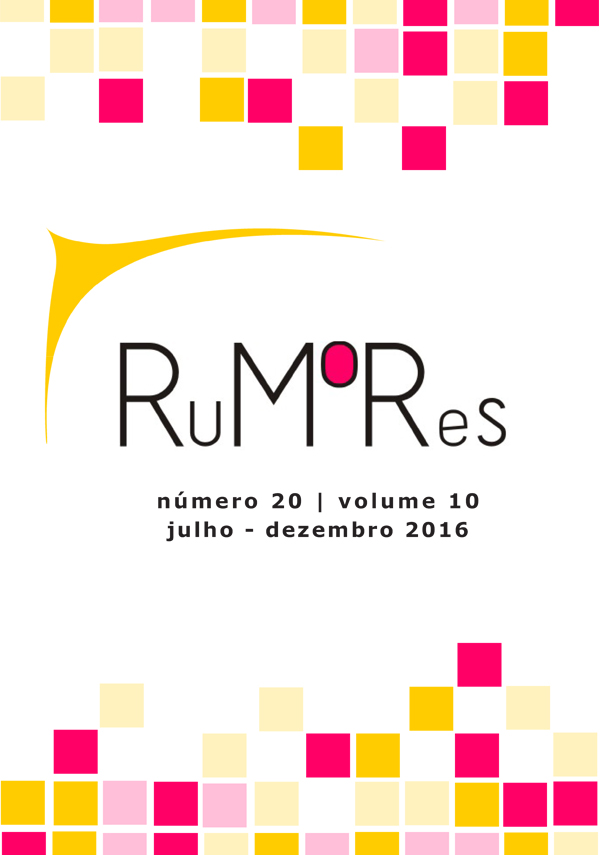What if Aristotle used Facebook? A friendship genealogy
DOI:
https://doi.org/10.11606/issn.1982-677X.rum.2016.120923Keywords:
digital technologies, friendship, social networksAbstract
The debate over the impact of digital technologies in friendship relationships is everywhere: form the press to the pub tables. However, most of these arguments have an excessively passionate feeling and result in blind defenses or neo-luddite fears. If we are to perform a serious study on friendship in the digital age, we cannot be limited to technical aspects of the problem, nor to fulfilling all requirements for an ideal of friendship. It is necessary to regard the complexity of our time in the core of where friendship practices take place.
Downloads
References
A AMIZADE Facebook. Entrevista com Zygmunt Bauman. Entrevistado por Fernando Schüler e Mário Mazzilli. 2011. Disponível em: <https://www.youtube.com/watch?v=5Lm2O3Q56Wg>. Acesso em: 15 fev. 2016.
ARISTÓTELES. Ética a Nicômaco. Bauru: Edipro, 2009.
AYMARD, M. Amizade e convivialidade. In: ARIÈS, P.; CHARTIER, R. (Eds.). História da vida privada: da renascença ao século das luzes. São Paulo: Companhia das Letras, 1991. p. 439-481. Volume 3.
BAUMAN, Z. Amor líquido: sobre a fragilidade dos laços humanos. Rio de Janeiro: Jorge Zahar, 2004.
BOYD, D.; ELLISON, N. B. Social network sites: definition, history, and scholarship. Journal of Computer Mediated Communication, Malden, v. 13, n. 1, p. 210-230, 2007.
BRUM, E. Exaustos-e-correndo-e-dopados. El País, Madri, 4 jul. 2016.
CÍCERO. Sobre a amizade. São Paulo: Nova Alexandria, 2006.
DERESIEWICZ, W. Faux friendship. The Chronicle of Higher Education, Washington, 6 dez. 2009.
DERRIDA, J. The politics of friendship. London: Verso, 2005.
ELISSON, N. B. et al. With a little help from my friends: how social network sites affect social capital processes. In: PAPACHARISSI, Z. (Ed.). A networked self: identity, community and culture on social network sites. New York: Routledge, 2011. p. 124-145.
FISCHER, C. S. Still connected: family and friends in America since 1970. New York: Russell Sage Foundation, 2011.
FOUCAULT, M. A hermenêutica do sujeito. São Paulo: Martins Fontes, 2006.
GERGEN, K. J. The saturated self: dilemmas of identity in contemporary life. New York: Basic Books, 2000.
LATOUR, B. Reassembling the social: an introduction to actor-network-theory. New York: Oxford University Press, 2005.
MONTAIGNE, M. Sobre a amizade. Rio de Janeiro: Tinta Negra, 2012.
NIETZSCHE, F. A gaia ciência. São Paulo: Companhia das Letras, 2004.
______. Humano, demasiado humano: um livro para espíritos livres. São Paulo: Companhia das Letras, 2004.
ORTEGA, F. Genealogias da amizade. São Paulo: Iluminuras, 2002.
PRIMO, A. Industrialização da amizade e a economia do curtir: estratégias de monetização em sites de redes sociais. In: BALDI, V.; OLIVEIRA, L. (Orgs.). A insustentável leveza da web: retóricas, dissonâncias e práticas na sociedade em rede. Salvador: EDUFBA, 2014, p. 109-130.
PRIMO, A. et al. Conversações fluidas na cibercultura. In: ENCONTRO DA COMPÓS – Grupo de Trabalho Comunicação e Cibercultura, 25., 2016, Goiânia. Anais… Belo Horizonte: Compós, 2016.
PUTNAM, R. D. Bowling alone: the collapse and revival of American community. New York: Simon & Schuster Paperbacks, 2000.
TURKLE, S. Alone together: why we expect more from technology and less from each other. New York: Basic Books, 2011.
______. Reclaiming conversation: the power of talk in a digital age. New York: Penguin Press, 2015.
WANG, H.; WELLMAN, B. Social connectivity in America: changes in adult friendship network size from 2002 to 2007. American Behavioral Scientist, Sedona, v. 53, n. 8, p. 1148-1169, 2010.
Downloads
Published
Issue
Section
License
Declaro a total e irrestrita cessão de direitos autorais sobre o texto enviado para publicação na Rumores – Revista Online de Comunicação, Linguagem e Mídias. Entendo que o conteúdo do artigo é de minha inteira responsabilidade, inclusive cabendo a mim a apresentação de permissão para uso de imagens, ilustrações, tabelas, gráficos de terceiros que, porventura, venham a integrá-lo.









